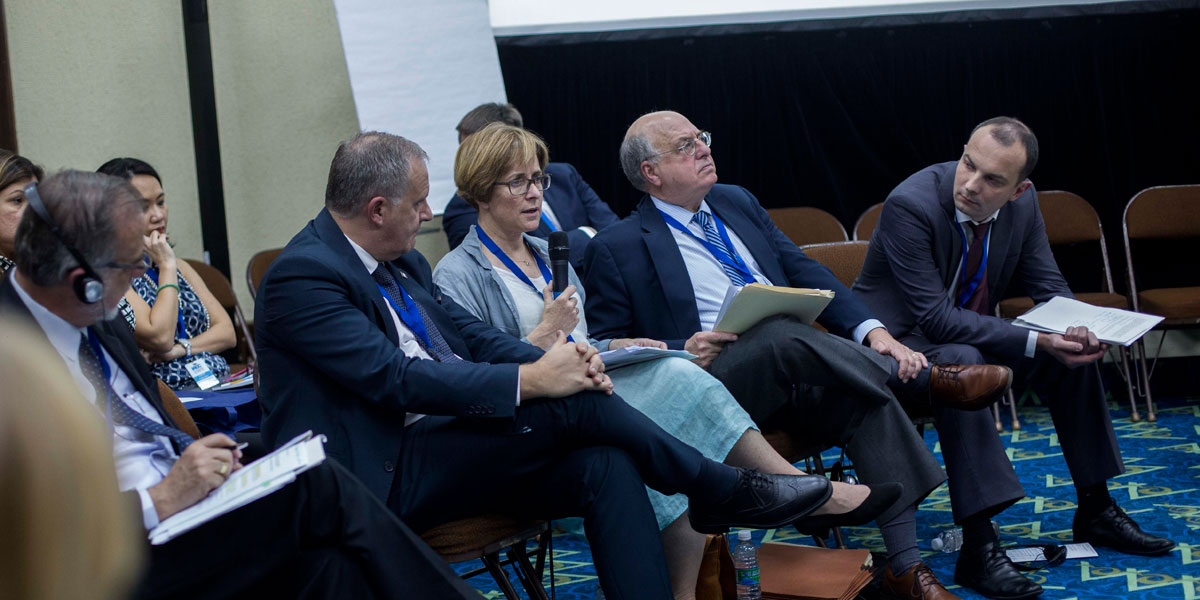
Discussing whistleblowing at 17IACC. Image: Selase Kove-Seyram
If someone who seems “mentally unstable” comes to you with an outrageous story about an airline being lost by a president during a late night poker game, should you look into it?
If an employee is disgruntled after being passed over for a promotion, do their concerns still have value?
The message from the panelists at a Saturday session entitled “Now that you have a law protecting whistleblowers, what’s next?” was a resounding “Yes!” While it’s important to evaluate the credibility of the information you’re being told, the experts said, a whistleblower’s motives for sharing it is generally irrelevant.
Moderator Beatrice Edwards, International Director of the Government Accountability Project, said far too often employers will attempt to “kill the whistleblower rather than tackle the message,” adding that people may not have pure motives “but it doesn’t mean that they are wrong.”
“They may be angry, disgruntled, insane,” Edwards said – but it doesn’t matter.
“No one is a saint,” said John Devitt, chief executive of Transparency International Ireland. During his presentation he talked about a “gap of trust and confidence” between employers and employees. In surveys Transparency International has carried out, 93% of Irish employers said that if a staff member came to them with a concern they’d act on it and no harm would come to the employee. Only around 50% of employees said they believed it.
Devitt – who established the Speak Up whistleblowing helpline – spoke about some of the stigma around the term “whistleblower.”
“We’ve dealt with whistleblowers who don’t want to be called whistleblowers.” However, many people fulfil the criteria of a whistleblower even if they dodge the term – like those who report as auditors or make suspicious transaction reports.
During surveys, Transparency International Ireland has found that 65% of employees have reported some form of wrongdoing at work – “which means there are some 300,000 whistleblowers in Ireland.”
“We want people to understand that whistleblowing is a normal thing,” he continued. “Some people like the word, some people don’t, ultimately I don’t think it really matters.”
Meanwhile, AJ Brown, professor of public policy and law at Griffith University in Australia, said the concept of a whistleblower was no longer a derogatory term. “For some they’re heroes, for others they’re crazy and difficult, (but) the reality is that whistleblowers are just people on scales.”
He added that he believed the stigma around the term is changing. “The language has shifted in the English speaking world. There’s a much higher recognition that whistleblowing is important and they’re an asset.”
Several former whistleblowers were present in the room during the session, including Miranda Brown, a former official at the United Nations Office of the High Commissioner for Human Rights, who lost her job after speaking out about child sex abuse by peacekeepers in the Central African Republic.
Sally Hayden is an award-winning Irish journalist based in London. After nearly two years as the chief staff writer for Vice News UK she went freelance in May. She has worked for the Thomson Reuters Foundation, BBC, the Financial Times, the Irish Times, the Sunday Times, Magnum Photos and many others, and has reported from Nigeria, Lebanon, France, Germany, Northern Ireland, Rwanda, Burkina Faso, Malawi, Ethiopia, and various other countries.


